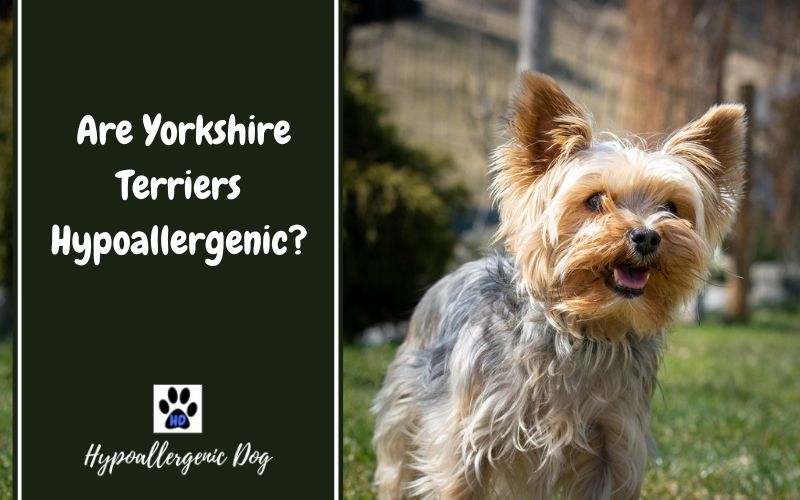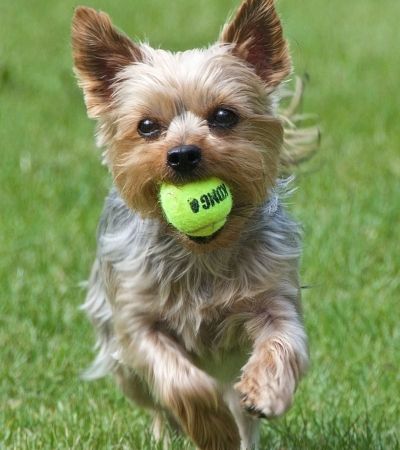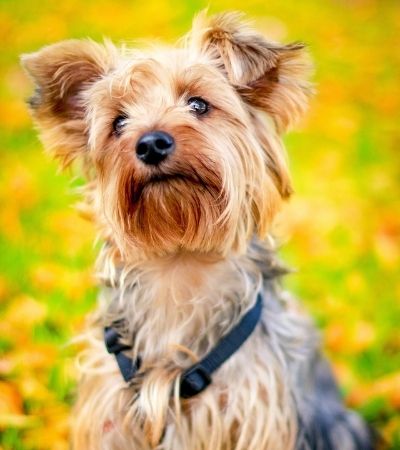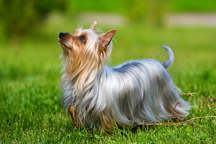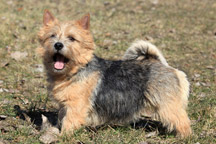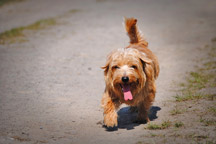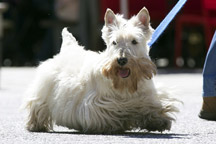Are Yorkshire Terriers Hypoallergenic?
Yes! The Yorkshire Terrier is a small hypoallergenic dog breed that hardly sheds or drools.
The charming Yorkshire Terrier is a lot of dog in a small package. This tiny pup is part of the toy terrier group, and it’s no wonder that they’ve topped the charts as one of the most popular breeds of dog for years now. Highly adaptable, very intelligent, and enormously cute, this lively little pooch is a wonderful pet. Unlike many dogs, the Yorkshire Terrier is surprisingly amenable to apartment living. Their small stature means that their exercise needs are easily met, and because they are non-shedding and produce very little dander, they are also considered to be hypoallergenic.
For a quick summary of the yorkshire terrier skip to our Yorkshire Terrier dog breed summary further down the page.
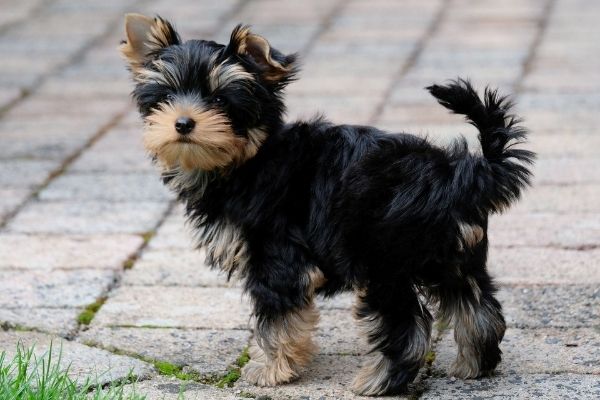
Yorkshire Terrier Quick Facts
| Hypoallergenic Dog: | Yes! |
| Shedding: | Low shedding |
| Drooling: | Low |
| Size: | Small |
| Breed Group: | Toy |
| Lifespan: | 13 – 16 years |
| Energy Level: | High |
| Trainability: | High |
| Family Dog: | Yes |
About the Breed
The Yorkshire Terrier Physical Characteristics and Coat
(Skip this section)
The Yorkshire Terrier, or Yorkie, as they’re often called, is a toy sized terrier. These dogs possess a beautiful straight coat of flowing, silky hair. Their colors tend to be two-tone – black and gold, blue and gold, black and tan or blue and tan. Some may have a little white in their coat also. When properly groomed, the Yorkie is essentially non-shedding. They also produce very little dander and don’t have a tendency to drool, so they are a good breed for those who are looking for a hypoallergenic dog that won’t cause an allergic reaction.
This tiny terrier is typically 8-9 inches tall and 4-7 pounds. Though they take their name from Yorkshire, England, where the breed was firmly established, this dog’s origins trace back to Scotland. Their ancestors followed Scottish merchants to England where they kept the vermin population under control and protected their master’s goods. Despite their humble beginnings, these dogs soon rose to fame as a popular pet among royals, as evidenced by numerous accounts and works of art.
Yorkshire Terrier Temperament
Yorkies are incredibly loyal dogs. They are highly affectionate, and love to be near their owners at all times. This breed is brave and heroic by nature, despite their small stature. A Yorkshire Terrier won’t hesitate to bark at anything it perceives to be a threat. Expect these lively dogs to be on-the-go, especially in unfamiliar environments! Your Yorkie is likely to want to catalog their surroundings as they like to take the responsibility of defending you into their own hands.
Does your Yorkie hate it when you leave the house?
A lot of dogs get separation anxiety. Music can help! Try this soundtrack for dogs. It really works!
Yorkshire Terrier Training and Exercise
Encouraging Good Behavior In Your Yorkshire Terrier
(Skip this section)
The Yorkie is more easily trained than some terriers, but like most terriers, they do possess a stubborn streak. This breed’s intelligence and witty attitude make them fun and interesting training partners. However, the Yorkshire Terrier is also relatively sensitive, and therefore does not respond well to negative reinforcement. Their small stature and easily excited nature may be off-putting to first time dog owners, so a bit of experience is helpful when training a Yorkie.
Luckily, it’s easy to exercise this breed. These dogs are small enough that a half hour walk once a day should suffice to satisfy their physical needs. Though they may be low maintenance when it comes to exercise, Yorkies are known to be very people-orientated, and don’t cope well with isolation. This breed is known to suffer separation anxiety, so crate training can be a huge asset for owners that are looking to leave an unattended Yorkie in the house for a few hours.
This tiny terrier is not the best pet for families with small children. Due to the fact that they are so small and delicate, they can be easily injured by playful kids. The Yorkshire Terrier is not a timid breed, and is likely to nip at children that frighten it.
Exercise Needs
Luckily, the energetic Yorkie is small in stature, so it doesn’t need quite as much exercise as larger dogs. That being said, these dogs do possess that intense, energetic attitude that’s so typical of terriers. Yorkshire Terriers possess a bit of an independent streak and they are very intelligent. You might interpret your Yorkie’s lack of obedience as condescending or defiant at times because they are bound to question your commands and have their own opinions about them. It’s best to work out some of the kinks of their attitude with about a 30-minute daily walk, or an equivalent play session. More importantly, this breed needs companionship and cuddle time.
Yorkshire Terrier Grooming and Care
Maintaining Your Yorkshire Terrier’s Coat
(Skip this section)
While they are low maintenance in the exercise category, Yorkies are incredibly demanding when it comes to grooming. The typical long, flowing coat needs daily grooming, even if the dog is kept inside. Some owners choose to give this dog a lower maintenance cut to cut down on their pup’s demanding grooming needs. If you do choose to go with a low maintenance cut, you can expect to spend more money on professional grooming in order to maintain the short length of the coat.
Teeth, Ears and Nails
Most of your Yorkie’s needs in this department are pretty typical. While you should pay attention to excessive ear scratching and check for bad odor or a build-up of ear wax, these dogs aren’t known to have ear problems. Their nails should be trimmed about once every two weeks, like most breeds. However, Yorkies are known to develop teeth problems if their oral hygiene isn’t regularly attended to. It’s important to maintain your Yorkie’s teeth on a regular basis, and keep an eye out for pale gums, discolored teeth, or bad smells coming from your pup’s mouth. You will need to brush this toy terrier’s teeth twice a week. Teeth brushing treats are a good idea too because they provide mental stimulation as well as dental care!
Health
Yorkshire Terrier Health Issues and Care
Like all dogs, the Yorkshire Terrier may suffer some health complaints. These include the following : Bronchitis, lymphangiectasia, portosystemic shunt, cataracts, keratitis sicca, hypoglycemia, Legg-Perthes Disease, skin allergies, retinal dysplasia, liver shunt, kneecap dislocation, and collapsed trachea.
Undersized Yorkies are known to be more at risk to develop health problems than those of a typical height. Among those health problems are issues with digestion that may cause vomiting and diarrhea.
Due to their popularity, there are some breeders that breed Yorkshire Terriers carelessly, which increases their risk of developing genetic conditions, or being predisposed to non-genetic health issues. It’s extremely important that you choose a Yorkie from a reputable breeder or rescue facility. Your breeder should be able to provide you with documentation to show that your puppy’s parents have a clean bill of health. Never, ever buy a puppy from a store! These stores are often fronts for factory-like establishments called “puppy mills”. Yorkies purchased from these dog factories almost always have severe behavioral and health issues! Any popular breed of dog is likely to be sold by a puppy-mill or by a breeder who doesn’t care about the health of their dogs.
Common Health Issues for Yorkshire Terrier
- Bronchitis
- Lymphangiectasia
- Portosystemic Shunt
- Cataracts
- Keratitis Sicca
- Hypoglycemia
- Legg-Perthes Disease
- Skin Allergies
Conclusion
(Skip this section)
The Yorkie is a bright, courageous, energetic dog. Historically, they were used to hunt vermin, but these dogs soon found their place in royal court, and they are still popular to this day. The Yorkshire Terrier typically has a long, silky coat, although some posses a slightly wavy coat that does not brush out into straight, even locks, and does not grow nearly as long. All Yorkies, however, are low dander dogs that shed minimally, if at all. Because of these qualities, this pooch is considered to be hypoallergenic. The Yorkshire Terrier has easily met exercise needs and adapts well to apartment living. They are very intelligent, and reasonably easy to train.
Yorkshire Terrier FAQ
How big is the Yorkshire Terrier?
Small. Their about as tall as an iPad is long, and they weigh less than a gallon of milk.
Is the Yorkshire Terrier good for apartments?
Yes! The Yorkshire Terrier is a very small, clean, low shedding dog that doesn’t have much of a smell, but they can be yappy.
Are Yorkies easy to train?
No. They’re smart, but they can be difficult to house train and they can be snappy towards other pets.
How much does a Yorkshire Terrier cost?
$1,000 – $1,500. You can buy them for less, but cheaper puppies have usually been mistreated and poorly bred.
Do Yorkies Shed?
No. Yorkies are essentially non-shedding, but you might spot a hair or two.
Do Yorkies bark a lot?
Yes. Yorkies are territorial and bossy, and they like to talk about that.
Does your Yorkie bark way too much?
Yorkies are super smart and get bored easily. Try training them with Brain Training for Dogs! This kind of mental stimulation will make your Yorkie much better behaved, and happier too!
Do Yorkies howl?
No. Yorkies seldom howl.
How long do Yorkies live?
A long time. Yorkshire Terriers can live 13 to 16 years when they’re healthy, and bred well.
How long do Teacup Yorkies live?
Not as long. Teacup Yorkies are usually not well bred, and they can have a lot of health problems.
What should I feed my Yorkshire Terrier?
Small, frequent bowls of dog food. The kibble should be tiny, and it helps to mix it with a bit of water to make it softer. Yorkshire terriers should eat at least twice a day.
What do Yorkies look like?
Small and foxy! All Yorkshire Terriers have long, silky coats that are steel blue and gold.
What were Yorkies bred for?
To hunt vermin. (That’s right, mice – we’re looking at you!)
Are Yorkies smart?
Yes! The Yorkshire Terrier is highly intelligent. (Maybe too much so!)
Are Yorkies good with kids?
No. Yorkshire Terriers are fragile and very small. They can easily be hurt by kids, and they have a tendency to bark at, and bite kids out of fear.
Yorkshire Terrier Facts Summary
Pro Tip! Having difficulties potty training your Yorkie? This book can help you house break your pup in 7 days! Check it out here!
| Breed | Yorkshire Terrier (small dog) |
| Other Names? | Yorkie |
| Hypoallergenic? | Yes |
| Height | 8-9 inches (20-23 cm ) |
| Weight | 4-7 pounds (2-3 kg ) |
| Lifespan | 13 – 16 years |
| Temperament | Alert, Courageous, Energetic, Independent, Intelligent, Loyal, Playful |
| Colours | Black & Gold, Black & Tan, Blue & Gold, Blue & Tan |
| Coat – describe the coat | Long, straight, and silky |
| How much grooming? | Daily |
| How much shedding | Non-shedding |
| Dander levels | Low dander level |
| Saliva – Do they Drool or Lick much? | Low |
| Energy levels | High |
| How much exercise do they need? | 30 minutes daily |
| Health problems | Bronchitis, lymphangiectasia, portosystemic shunt, cataracts, and keratitis sicca, hypoglycemia, Legg-Perthes Disease, skin allergies, retinal dysplasia, liver shunt, kneecap dislocation, collapsed trachea |
| Good for apartment? | Yes |
| Suitable for kids? | Yes |
| How much do they bark? | Frequent |
| Can they be left alone? | Not for long periods of time, these dogs are known to suffer separation anxiety |
| Intelligent? | Highly Intelligent |
| Trainable? | Easy to Train, but they possess a stubborn streak |
| How popular as a pet? | One of the top ten most popular dog breeds |
| Any other important facts? | Yorkshire terriers have humble origins and Scottish ancestry. Though they were once used as vermin-hunters for tradesmen, they soon became popular pets for royalty. |

